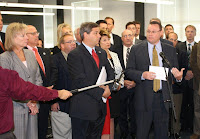Today, Republican legislators from both the House and Senate Caucuses unveiled legislation to repeal the Democrat-approved job killing computer services tax. The legislative measure, which contains the same language as the ballot question recently approved by Attorney General Martha Coakley, is just the latest effort the minority party has put forth in eliminating this unprecedented tax.
Announced during a press conference at Genuine Interactive, a leading interactive agency, the proposed bill puts forth a targeted approach to repealing the largest and broadest tax on computer and software services in the nation.
“We can’t afford to penalize innovation and job creation in one of the state’s most promising sectors if we hope to have the kind of robust economic recovery that creates the jobs people need and the tax revenue state government depends on,” said Senate Minority Leader Bruce Tarr (R-Gloucester). “The time is now to change course from increasing taxes on productivity and focus on creating a climate for job growth and reform and efficiency in our state’s operations.”
The filing of legislation comes on the heels of the Massachusetts House and Senate Republican Caucus’ statewide 2013 Technology Tax Business Roundtables. The weeklong series of roundtable discussions conducted by Republican lawmakers included conversations with technology industry professionals and representatives from area chambers of commerce about the negative effects of the technology tax. The roundtable discussions were initiated due to the fact that Democratic leadership did not provide a public hearing to solicit public testimony from those affected by the tax on software and computer services.
“Since this reckless tax on the technology industry was approved, we have seen a steady decline in business confidence within Massachusetts,” said House Minority Leader Brad Jones (R-North Reading). “There remains absolutely no appetite for this tax, and it continues to hurt the economic prospects for one of our state’s most vibrant and prosperous trades, as well as other industries who are suffering from the trickle-down effect of this careless revenue mechanism. The way to encourage growth and development within the Commonwealth is not through ill-conceived taxes, but through business-friendly directives and initiatives.”
Republican lawmakers highlighted the fact that the Commonwealth does not collect taxes on any other service, and expressed fear that the computer services tax sets a dangerous precedent for future efforts to tax other vital services. Furthermore, House and Senate Republicans had each offered revenue-neutral proposals, which if passed, would have avoided the implementation of the technology tax. Industry leaders such as the Massachusetts Taxpayers Foundation and the Massachusetts High Technology Council have repeatedly warned of the destructive nature of the new tax which is slated to stifle the high-tech industry by close to $500 million a year.
"Genuine Interactive started off as a four person agency in 2005 and since then, it's grown to a 100 person company," said John Grayson, Chief Executive Officer of Genuine. "This tax on technology services is negatively impacting the business and is threatening the future of the entire technology and innovation industry. Out-of-state vendors are seeing this as an opportunity to attract businesses away from Massachusetts and that is going to affect the overall economy of the Commonwealth. In a market where work is already being outsourced to other countries, this puts yet another burden on the technology economy in Massachusetts."
Having been filed in both the House and Senate, the joint legislation awaits assignment to a legislative committee.
skip to main |
skip to sidebar

Massachusetts House Republican Caucus

- Massachusetts House Republicans
- This blog is an opportunity for the members of the House Republican Caucus to share observations with you from across the aisle. We work to provide an alternative voice on Beacon Hill and hope this blog will act as an outlet for us to share important happenings with you from across the Commonwealth.
Who We Are
- Minority Leader Bradley H. Jones, Jr.
- Assistant Minority Leader Kimberly Ferguson
- Second Assistant Minority Leader Paul Frost
- Third Assistant Minority Leader David Muradian
- Third Assistant Minority Leader David Vieira
- Rep. Todd Smola, Ranking Member - House Ways & Means
- Rep. Donald Berthiaume
- Rep. Nicholas Boldyga
- Rep. Michael Chaisson
- Rep. David DeCoste
- Rep. John Gaskey
- Rep. Steven Howitt
- Rep. Hannah Kane
- Rep. Marc Lombardo
- Rep. John Marsi
- Rep. Joseph McKenna
- Rep. Norman Orrall
- Rep. Kelly Pease
- Rep. Michael Soter
- Rep. Alyson Sullivan-Almeida
- Rep. Kenneth Sweezey
- Rep. Justin Thurber
- Rep. Marcus Vaughn
- Rep. Donald Wong
- Rep. Steven Xiarhos
***Watch House Sessions Live***
Our Links
- Associated Industries of Massachusetts
- Blue Mass Group
- Boston Globe
- Boston Herald
- Cape Cod Times
- Citizens for Limited Taxation
- Gloucester Daily Times
- Lowell Sun
- Massachusetts Republican Party
- Massachusetts State Legislature
- Massachusetts Taxpayers Foundation
- National Federation of Independent Business
- Pioneer Institute
- Red Mass Group
- Scaling Beacon Hill
- State House News Service
- The Beacon Hill Institute
- The Patriot Ledger
- The Republican
- The Sun Chronicle
- Worcester Telegram & Gazette
Blog Archive
-
▼
2013
(109)
-
▼
September
(8)
- Republican Legislators Successfully Advocate for R...
- House Minority Leader Brad Jones’ Statement on Rep...
- House and Senate Minority Leaders’ Statement on De...
- We Remember...
- Special Elections – 6th Bristol, 16th Worcester, a...
- Republican Legislators Unleash New Effort to Repea...
- MEDIA ADVISORY - Republican Lawmakers to Unveil Le...
- House Minority Leader Brad Jones’ Statement on Att...
-
▼
September
(8)

